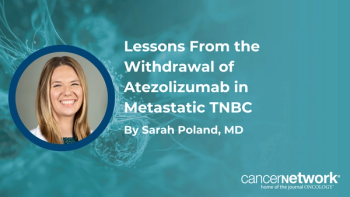
Treating Skin-Associated Toxicities Related to EGFR Inhibitors
In my practice, I am constantly being asked how to properly treat scalp involvement in relation to these skin toxicities.
You are likely familiar with skin-associated toxicities that accompany epidermal growth factor receptor (EGFR) inhibitor therapies such as tyrosine kinase inhibitors (e.g., erlotinib, lapatinib) and certain monoclonal antibodies (e.g., cetuximab, panitumumab). Thanks to the groundbreaking work of Mario Lacouture, MD, we now have a much better handle on treating these patients and in some cases even preventing skin toxicities from developing.
For a quick review, it is important when starting patients on the aforementioned therapies to educate them about good skin care, including:
- Use of unscented emollient lotions to face and body at least twice a day.
- Use of UVA/UVB sunscreen and to avoid prolonged direct sun exposure if at all possible.
- Avoid exposure to extreme cold or hot water.
- Avoid scented perfumes or soaps.
I’m always telling my patients to hydrate, hydrate, hydrate. Meaning hydrate your skin with moisturizer/lotion/sunscreen and do this several times a day (and of course hydrate your body with water…for many reasons). Though the EGFR-rash typically looks like acne, it’s important patients understand that you don’t want to dry it up like you would traditional acne. Again, keeping the skin soft and moist is the goal.
There are some who subscribe now to the idea of preemptive therapy to try and avoid a rash developing, utilizing both a topical steroid (e.g., 1% hydrocortisone cream) and doxycycline 100mg twice a day, or minocycline 100mg daily upfront.
I can say that in my practice of 13 physicians and six nurse practitioners, not all adhere to this recommendation. Some worry about the potential side effects of tetracyclines, potential for interaction with other drugs, or just the idea of giving someone something they may not need. On the other hand, knowing how bad this rash can be for most who take EGFR inhibitor therapy, I tend to lean more toward helping patients avoid skin toxicity from the get-go. If a provider opts to wait until potential skin toxicity develops, treatment would follow the algorithm outlined in
In my practice, I am constantly being asked how to properly treat scalp involvement in relation to these skin toxicities. Often patients will not only get the classic acneiform rash on the face, upper chest and back, but they also will develop these same erythemic, pruritic, sometimes pustular lesions on the scalp. For most patients who have hair, it can be problematic to get at those lesions to adequately treat and heal.
There are two treatment options that can I turn to that you may find helpful as well:
- Capex (fluocinolone) 0.01% shampoo daily, 30 ml lather. Leave on for 5 minutes, then rinse. This comes in 120 ml bottle. For added support, combine with triple moisture neutrogenic conditioner.
- Clobetasol or desonide foam: Apply and massage into scalp twice daily.
It is recommended that patients treated with EGFR inhibitors begin prophylactic rash therapy with doxycycline 100 mg twice a day or minocycline 100 mg daily, and a low potency topical steroid twice a day for the first 6 weeks of therapy.
So what are you doing in your practice? Preventative therapy up front? Wait and see? Do you have any other tricks of the trade that may help to better treat these drug toxicities?
Newsletter
Stay up to date on recent advances in the multidisciplinary approach to cancer.
Related Content


Molecular Interception: Discussing the Future of Surgery in Breast Cancer

Lessons From the Withdrawal of Atezolizumab in Metastatic TNBC


















































